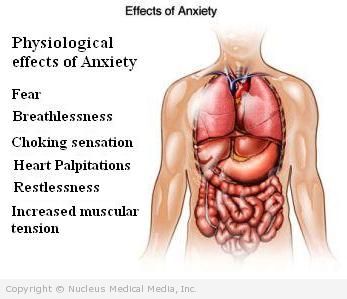Generalized anxiety disorder – GAD
Generalized anxiety disorder – Definition
Generalized anxiety disorder (GAD) is an anxiety disorder marked by chronic, exaggerated worrying and anxiety about everyday life. Everyone worries at times. But people with GAD can never relax and usually anticipate the worst. They often worry excessively about health, family, work, or money. The worry is so severe that it interferes with their ability to live their lives. The anxiety can also progress to the point where people “worry about worrying.” GAD usually starts in childhood or adolescence. But it can also start in early adulthood.
Generalized anxiety disorder – Causes
The exact cause of GAD is unknown. Researchers believe it is caused by a combination of genetic, environmental, developmental, and psychological factors.
Generalized anxiety disorder – Risk Factors
Factors that may increase the risk of GAD include:
- Sex: female
- Family member with an anxiety disorder
- Increase in stress
- Exposure to physical or emotional trauma
- Unemployment, poverty
- Drug abuse
- Medical condition or disability
Generalized anxiety disorder – Symptoms
Symptoms of GAD usually develop slowly. People with GAD often have both psychological and physical symptoms of anxiety.
Psychological symptoms include:
- Excessive ongoing worrying and tension
- Feeling tense or edgy
- Irritability, overly stressed
- Difficulty concentrating, mind going “blank”
Physical symptoms include:
- Muscle tension
- Lightheadedness
- Trembling
- Difficulty sleeping
- Restlessness
- Shortness of breath
- Sweating
- Heart palpitations
- Choking sensation
- Abdominal discomfort
- Diarrhea
- Nausea
People with GAD often have other anxiety disorders, depression, and/or alcohol abuse or drug abuse
Generalized anxiety disorder – Diagnosis
Your doctor will ask you about your symptoms and medical history. A physical exam will be done. Your doctor will also look for other medical conditions that may be causing your symptoms (eg, hyperthyroidism).
You will be asked about any medicines that you are taking, including over-the-counter products, herbs, and supplements. Some medicines can cause side effects similar to the symptoms of GAD. Your doctor will also ask about any other substances that you may be using (eg, nicotine, caffeine, illegal drugs, prescription medicines, alcohol).
To make a diagnosis of GAD, symptoms must:
- Be present more days than not
- Be present for at least six months
- Interfere with your life (eg, causing you to miss work or school)
Generalized anxiety disorder – Treatment
If you have a mild form of GAD, your doctor will probably first have you try therapy to learn to manage anxious thoughts.
Cognitive Behavioral Therapy
During cognitive-behavioral therapy (CBT), your therapist will work with you to change your patterns of thinking. This will allow you to notice how you react to situations that cause anxiety. You will then learn to change your thinking so you can react differently. This can decrease the symptoms of anxiety.
Behavioral Therapy
Your therapist will teach you relaxation techniques, including deep breathing, muscle relaxation, and visualization. Learning ways to relax can help you gain control over anxiety. Instead of reacting with worry and tension, you can learn to remain calm. Your therapist may also slowly expose you to the situations that cause worry and tension. This can allow you to reduce your anxiety in a safe environment.
Support Groups
Joining a support group or self-help group is often helpful. This form of support allows you to share your experiences and learn how others have coped with GAD.
Biofeedback
Biofeedback works by attaching sensors to the body. A therapist helps you understand your body’s signals so you can use them to reduce your anxiety.
Medication
Medicine can be prescribed for symptoms that are severe and make it difficult to function. Medicines can help relieve symptoms so you can concentrate on getting better. It is important to note that many medicines cannot be stopped abruptly but need to be tapered off. Check with your doctor before discontinuing any medicine.
Medicines may include:
- Benzodiazepines — to relax your body and keep it from tensing in response to anxious thoughts
- Note: These medicines need to be monitored closely because they may cause dependence.
- Buspirone (BuSpar) — an anti-anxiety medicine that does not cause dependence
- Antidepressant medicines (most commonly selective serotonin re-uptake inhibitors [SSRIs]) — to help control anxious thoughts
Lifestyle Changes
- Learn relaxation techniques (eg, deep breathing, meditation, yoga).
- Avoid tobacco, caffeine, and drugs. These can worsen anxiety.
- Exercise on a regular basis.
- Get an appropriate amount of sleep each night.
- Identify stressful situations. Avoid them when possible.
- If you drink alcohol, do so in moderation.
Generalized anxiety disorder – Prevention
There are no guidelines for preventing GAD.

